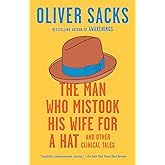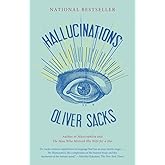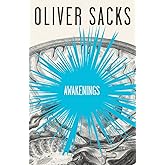
Download the free Kindle app and start reading Kindle books instantly on your smartphone, tablet, or computer - no Kindle device required.
Read instantly on your browser with Kindle for Web.
Using your mobile phone camera - scan the code below and download the Kindle app.



 Audible sample
Audible sample A Leg to Stand On Paperback – April 29, 1998
In A Leg to Stand On, it is Sacks himself who is the patient: an encounter with a bull on a desolate mountain in Norway has left him with a severely damaged leg. But what should be a routine recuperation is actually the beginning of a strange medical journey when he finds that his leg uncannily no longer feels part of his body. Sacks's brilliant description of his crisis and eventual recovery is not only an illuminating examination of the experience of patienthood and the inner nature of illness and health but also a fascinating exploration of the physical basis of identity.
- Print length224 pages
- LanguageEnglish
- PublisherTouchstone
- Publication dateApril 29, 1998
- Dimensions5.5 x 0.7 x 8.44 inches
- ISBN-100684853957
- ISBN-13978-0684853956
Book recommendations, author interviews, editors' picks, and more. Read it now
Customers who viewed this item also viewed
Editorial Reviews
Review
Jerome Bruner The New York Review of Books A neurologist in [the] great tradition... [this is] a narrative comparable to Conrad's The Secret Sharer.
Vic Sussman The Washington Post Book World In calling for a neurology of the soul and a deeper and more humane medicine, Sacks's remarkable book raises issues of profound importance for everyone interested in humane health care and the human application of science.
About the Author
Product details
- Publisher : Touchstone; Reprint edition (April 29, 1998)
- Language : English
- Paperback : 224 pages
- ISBN-10 : 0684853957
- ISBN-13 : 978-0684853956
- Item Weight : 7.2 ounces
- Dimensions : 5.5 x 0.7 x 8.44 inches
- Best Sellers Rank: #1,248,777 in Books (See Top 100 in Books)
- #2,762 in Medical Professional Biographies
- #5,028 in Medical General Psychology
- #37,374 in Memoirs (Books)
- Customer Reviews:
About the author

Oliver Sacks was born in 1933 in London and was educated at Queen's College, Oxford. He completed his medical training at San Francisco's Mount Zion Hospital and at UCLA before moving to New York, where he soon encountered the patients whom he would write about in his book Awakenings.
Dr Sacks spent almost fifty years working as a neurologist and wrote many books, including The Man Who Mistook His Wife for a Hat, Musicophilia, and Hallucinations, about the strange neurological predicaments and conditions of his patients. The New York Times referred to him as 'the poet laureate of medicine', and over the years he received many awards, including honours from the Guggenheim Foundation, the National Science Foundation, the American Academy of Arts and Letters, and the Royal College of Physicians. In 2008, he was appointed Commander of the British Empire. His memoir, On the Move, was published shortly before his death in August 2015.
Customer reviews
Customer Reviews, including Product Star Ratings help customers to learn more about the product and decide whether it is the right product for them.
To calculate the overall star rating and percentage breakdown by star, we don’t use a simple average. Instead, our system considers things like how recent a review is and if the reviewer bought the item on Amazon. It also analyzed reviews to verify trustworthiness.
Learn more how customers reviews work on AmazonCustomers say
Customers praise the book's literary style and find it a great read. Moreover, they appreciate its insightful content, with one customer noting how it illuminates the body/mind connection. Additionally, the narrative receives positive feedback, with one review highlighting its compelling storytelling by a world-renowned neurologist.
AI-generated from the text of customer reviews
Select to learn more
Customers find the book valuable, describing it as great and important, with one customer noting the author's good grasp of diverse English literature.
"...combination for a doctor, but he achieves it like always with exquisite aplomb...." Read more
"...Dr Sacks' prose of course is flowery, and he has a good grasp of diverse English literature...." Read more
"...I feel it was a good deal, and I enjoyed the book immensely." Read more
"...He's so clear and vivid. This book is valuable because it illuminated the body/mind connection." Read more
Customers appreciate the writing style of the book, describing it as great and literary, with one customer noting its wonderful detail.
"...Sacks writing style is sophisticate and beautiful, a rare combination for a doctor, but he achieves it like always with exquisite aplomb...." Read more
"...Oliver Sacks has a literary style that I love. He's so clear and vivid. This book is valuable because it illuminated the body/mind connection." Read more
"...is padded by ruminations and divergent passages that make getting through the text difficult...." Read more
"...I enjoyed his writing style." Read more
Customers appreciate the book's insights, with one noting how it explains neurology clearly and another highlighting how it illuminates the body/mind connection.
"...accident and major injury to his leg, he is led to reflect deeply on patient doctor relationships and his sensitive analysis leads to insights into..." Read more
"This book is autobiographical. It's based on his own experience of a compound leg fracture he got while on a mountain...." Read more
"...And to recall and revel in the return to wholeness." Read more
"...There is much to be learned about the human body and how it works. Quite an adventure. Plan to read all of Oliver Sacks books. I have read 3 so far." Read more
Customers enjoy the narrative of the book, finding it excellent and interesting, with one customer describing it as a compelling tale told by a world-renowned neurologist.
"As always Dr. Sacks writes a very well told story, in this case a very personal one...." Read more
"This book was very interesting as long as the author was describing his situation; but he developed his whole experience into a new neurological..." Read more
"...If you can digest the writing, there is great meaning in the narratives." Read more
"...Quite an adventure. Plan to read all of Oliver Sacks books. I have read 3 so far." Read more
Top reviews from the United States
There was a problem filtering reviews. Please reload the page.
- Reviewed in the United States on May 4, 2008Sacks brilliantly chronicles his experiences as a neurological patient. His experience came from a mountain climbing expedition, where he totally broke a leg and severed or damaged the femoral nerve in his leg. This book is his story of recovery from that intense and serious accident.
What Sacks concentrates on in his story are the feelings of patients, particularly his own, who have serious neurological problems and how those feelings translate to the condition itself, or the condition translates to the feelings. His most significant commentary has to do with the feelings regarding the disassociation with the affected body part. One starts to feel that it is foreign, no longer a natural part of the body. And, that it no longer exists and will never again exist to the patient.
In addition, he carefully points out the non-recognition of these patient feelings by his Neurologist who sees himself more as a fixer of mechanical problems with the body, rather than a Dr. treating a real live human being with feelings of alienation of the limb and alienation from society. Sacks writing style is sophisticate and beautiful, a rare combination for a doctor, but he achieves it like always with exquisite aplomb. The book is highly recommended for all readers interested in physical recovery, especially those who have had a significant neurological problem.
- Reviewed in the United States on April 21, 2014As always Dr. Sacks writes a very well told story, in this case a very personal one. Having survived a very serious accident and major injury to his leg, he is led to reflect deeply on patient doctor relationships and his sensitive analysis leads to insights into the potential improvement of current medical practices in situations such as he himself experienced. In the course of his reflections he delves deeply into the nature of our body self image and how we tend to automatically dismiss and denigrate the infirmity of others. His account of his injury and of the entire healing and recovery process is in many ways heroic and should prove to be an inspiration to others who have suffered traumatic injury. Perhaps unusually, he is moved in a deeply religious way to reflect on his recovery.
- Reviewed in the United States on June 24, 2017This updated version of the autobiographical account by Dr Sacks of his experience of a short-term bout of inability to use his left leg allows Sacks to reflect possible causes for this condition. The updated version allows one to gain a unique perspective by Dr Sacks' of the turmoil of his illness. There are few autobiographical accounts of neurological disease by neuroscientists, and so such a view is to cherish.
This is a slim book which would not require more than a few days to complete. Unfortunately, the text is padded by ruminations and divergent passages that make getting through the text difficult. My attention wandered, wanting to learn, "What happened next?" The illness occupied only a few weeks.
Dr Sacks' prose of course is flowery, and he has a good grasp of diverse English literature. (I am writing in the present tense; Dr Sacks passed away in 2015. The illness in this book occurred in 1974.) When he sticks to describing the illness itself, one can have a vivid account of paralysis and self-identity.
The book was early in the long literary course of Dr Sacks. I cannot help imagining that if a later Dr Sacks had written the book, it would have been more direct. A good editor could have been used.
Close to the time of Dr Sacks' passing away, a debate occurred in the scientific literature what exactly had occurred to him. Dr Sacks speculates a loss of ability to mobilize his leg caused by some sort of a peripheral nerve injury, associated with a peculiar deficient of function in the spinal cord. Sacks himself witnessed similar (but still much different) phenomena in patients he had taken care of, and even reports a similar deficit in a pet dog. A different noted neurologist ventured that actually this was what is nowadays termed "functional neurological disorder," in earlier years termed hysteria, conversion disorder, or psychogenic disorder. Sacks rebutted the notion, but he left his mind open to the possibility.
As a publishing neurologist myself, I side with the view that this was a functional neurological disorder, but not one that is founded on a foundation of anxiety or other psychiatric turmoil. More reports are appearing in the literature that some patients encounter impaired neurologic function following abrupt injuries, without the association of verifiable nervous system structural damage. These accounts, including Dr Sacks' experience, point to a kind of neurological dysfunction that is still very poorly understood, but it is very common and disabling. The good news is that such disorders can respond to concentrated physical therapy, as indeed assisted Dr Sacks himself.
Regardless of one's own opinion what may have caused the difficulty, the account provides the reader the rare opportunity for a neurologist to visit his own nervous system dysfunction, a look from the "inside out" rather than the outside perspective of doctors looking at their patients, including Dr Sacks himself in his many other wonderful books.
- Reviewed in the United States on July 10, 2015The book was in fair condition, but to be expected for the price. I feel it was a good deal, and I enjoyed the book immensely.
- Reviewed in the United States on October 7, 2024... and certainly not something I would want to experience, but as there are people who do, perhaps it is best to know about (and be prepared?).
- Reviewed in the United States on January 22, 2016This book is autobiographical. It's based on his own experience of a compound leg fracture he got while on a mountain. In order to get help, he had to slide down on his butt. The story takes us through the medical intervention and his long recovery. Oliver Sacks has a literary style that I love. He's so clear and vivid. This book is valuable because it illuminated the body/mind connection.
- Reviewed in the United States on September 3, 2023Absolutely love this book. Misplaced my last copy so I ordered a replacement copy to re-read. Replacement copy will go in the trash unread -- smells strongly of cigar and pages are yellowed. I'll have to buy another, better quality, book.
Top reviews from other countries
-
 Darma ElenaReviewed in Italy on August 23, 2022
Darma ElenaReviewed in Italy on August 23, 20224.0 out of 5 stars Bel libro, brutta edizione
Ho Incominciato a leggerlo appena fuori dalla busta! Un libro importante, di cui ho saputo dal blog Marginalia di Maria Popova.
 Ho Incominciato a leggerlo appena fuori dalla busta! Un libro importante, di cui ho saputo dal blog Marginalia di Maria Popova.4.0 out of 5 stars
Ho Incominciato a leggerlo appena fuori dalla busta! Un libro importante, di cui ho saputo dal blog Marginalia di Maria Popova.4.0 out of 5 stars Darma Elena
Darma ElenaBel libro, brutta edizione
Reviewed in Italy on August 23, 2022
Images in this review
 sam lockleyReviewed in the United Kingdom on January 12, 2013
sam lockleyReviewed in the United Kingdom on January 12, 20135.0 out of 5 stars A neurological and existential journey
I am currently writing an essay regarding disability and its relation to the medical profession. In this book Oliver Sacks provides a keen insight into both his relationship with the clinicians around him and also the divide that occurs within himself following a neurological injury to his leg. He learns much about the existential challenges faced by the disabled and also the flaws in how the medical profession interact with this demographic. Sacks writes with the profound amazement of one who has just opened his eyes. I highly recommend this book.
 Jean LeducReviewed in Canada on December 28, 2015
Jean LeducReviewed in Canada on December 28, 20155.0 out of 5 stars Five Stars
Fantastic book, reveals much about the human mind and its vulnerable connection to the body.
 Anita FleiceReviewed in Canada on June 19, 2015
Anita FleiceReviewed in Canada on June 19, 20155.0 out of 5 stars Five Stars
I love anything by Oliver Sacks...he's so eloquent and passionate.
 J M WoodReviewed in the United Kingdom on December 8, 2023
J M WoodReviewed in the United Kingdom on December 8, 20235.0 out of 5 stars Little known treasure
I stumbled across ‘A leg to stand on’ (near pun not intended) and am glad I did.
Good read, lots covered.
OS recounts the situation, an accident he suffered and tells of the moods and the mental states rather wonderfully

















